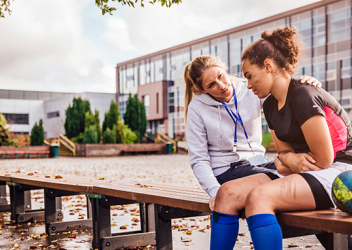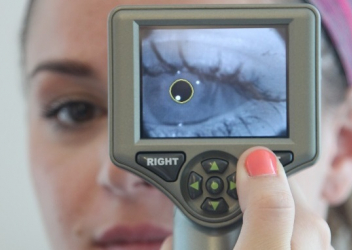CARE Consortium Study
Concussion assessment research is important because sports-related concussion (SRC) is a major public health issue; yet, clinical management remains among the greatest challenges in sports medicine.
The National Collegiate Athletic Association (NCAA) and Department of Defense (DoD) are collaborating in a multi-tiered, multi-institution/investigator research consortium to address public concerns and existing gaps in the basic and clinical science related to the natural history, evaluation and management, and prevention of SRC. The Concussion Assessment Research Education (CARE) Consortium Longitudinal Clinical Study is led by the University of Michigan to assess the natural history of concussion.
CHOP serves as a CARE Consortium Study site in collaboration with the University of Pennsylvania (Penn). Christina L. Master, MD serves as principal investigator for the CHOP site.
Study Details
- Study Objectives
CHOP's cohort study will enroll and conduct baseline assessments on Penn varsity student-athletes. Those who experience concussion(s) will complete an immediate post-concussion and follow-up assessments.The primary objective of this concussion assessment research is to conduct a prospective, longitudinal, multi-sport, cohort study that delineates the natural history of concussion in both men and women by incorporating a multi-dimensional assessment of standardized clinical measures of post-concussive symptomatology, performance-based testing (cognitive function, postural stability), and psychological health.
- Investigational Plan
CHOP’s involvement in the CARE consortium began in September 2016, when approximately 1,000 varsity student-athletes and cheerleaders from Penn Athletics were invited to participate at the beginning of their sport competitive season. New varsity student-athletes are invited to participate each year. Over 30 institutions have participated in the consortium since 2014 enrolling over 40,000 student athletes and collecting detailed data on over 3,000 concussions. Data from UPenn athletes will be aggregated with data from the other performance sites as part of the larger NCAA-DoD Grand Alliance: CARE Consortium project.
All participants will complete a baseline assessment prior to the official start of their respective competitive sport season. Information will be collected via questionnaires and assessments on the following:
- demographics
- medical history
- symptoms
- neurological and neurocognitive functions
- oculomotor and vestibular functions
- Study Participant FAQs
What if a participant is diagnosed with a concussion? If a subject is diagnosed with a concussion at any point after enrollment, they will complete post-concussion assessments at scheduled intervals. Immediately, post-concussion participants will complete neurological, postural stability, visio-vestibular, and symptom assessments. They will complete daily symptom checks until they are symptom free. They will receive post-concussion follow-ups at set intervals until 6 months post-concussion which will include neurocognitive, neurological, postural stability, oculomotor, vestibular, and symptom assessments.
Why are oculomotor and vestibular functions important? Vision disorders and vestibular deficits are common in young concussion patients and can hinder their recovery and getting back to normal school and athletic routines.
Select CARE Consortium Research Publications
Researchers assessed concussion risk among athletes who have self-reported a diagnosis of attention deficit/hyperactivity disorder (ADHD), learning disability (LD), and ADHD+LD as compared to controls. Results suggest neurodevelopmental disorders may be associated with increased odds of single and multiple concussions, irrespective of sex. After accounting for concussion history, it appears only male athletes with ADHD+LD had greater risk than respective controls. There were no significant differences between females and males with ADHD, LD, or ADHD+LD for either odds of concussion history or risk for incurring concussion.
This study defined the acute natural history of sport concussion in male and female collegiate athletes participating in a broad array of sports. Primary outcomes included the time (days) from injury until initiation of a return to participation (RTP) protocol and time from injury until medical clearance for unrestricted RTP. At one month post-injury, most collegiate athletes were cleared to begin the RTP protocol or cleared for unrestricted school participation. Other factors had a small effect, suggesting there was a unified approach to post injury monitoring and management across all athletes.
Concussion Baseline assessments must reflect the individual's true and most optimized performance to serve as a useful comparison. Mental fatigue and motivation throughout baseline testing may alter individual assessment performance. To examine the influence of the order of administration (OoA) of concussion baseline tests on symptom, postural stability, cognitive screening, and computerized neurocognitive test outcomes, this study examined healthy collegiate student-athletes’ and military cadets’ (n = 2898) performance on clinical assessments and determined that completing them in this OoA: (1) ImPACT, (2) SAC, (3) BESS, and (4) SCAT symptom checklist may improve performance across assessments collectively.
Differences in Sport-Related Concussion for Female and Male Athletes in Comparable Collegiate Sports
This study collected data on 1,071 concussions that occurred between 2014 and 2017 across more than 30 colleges, universities and service academies participating in the CARE Consortium, a NCAA and Department of Defense collaborative research effort. Minds Matter researchers found no difference in the concussion recovery times of female and male collegiate athletes in comparable sports. The study did, however, find subtle differences in recovery time depending on the type of sport and the division level of the sport. While biological sex differences in concussion recovery may exist, the findings suggest that improved equity in access to sports medical care among college athletes may be contributing to these similar outcomes. Read the press release.
Post-Injury Outcomes Following Non-Sport Related Concussion: A CARE Consortium Study
Researchers analyzed data from the CARE Consortium on 3,500 college athletes, including 555 that experienced a non-sports-related concussion. They found that college athletes had worse post-injury outcomes related to concussions experienced outside of sports than those experienced while playing sports, with female athletes having more severe symptoms than male athletes. The study shows that there is an opportunity to improve clinical outcomes by investigating how concussions that happen outside of sports are reported and managed. Read the press release.








